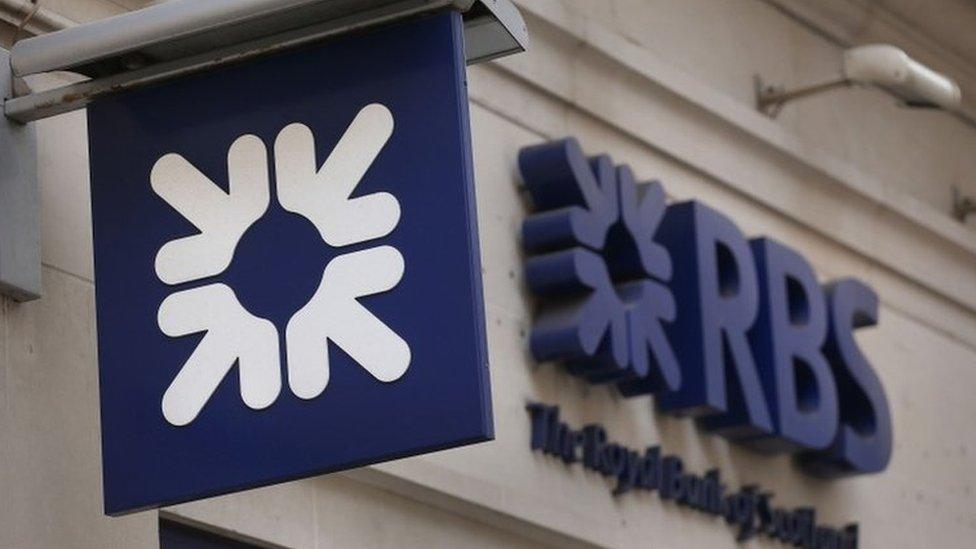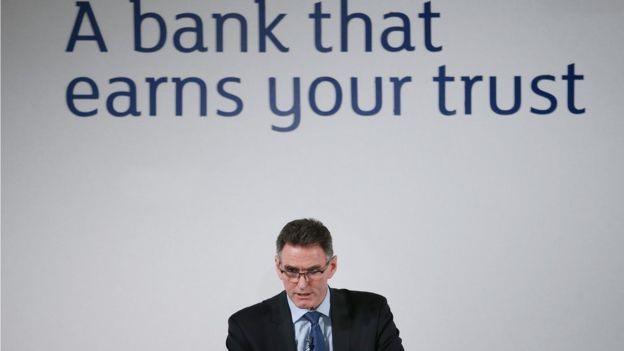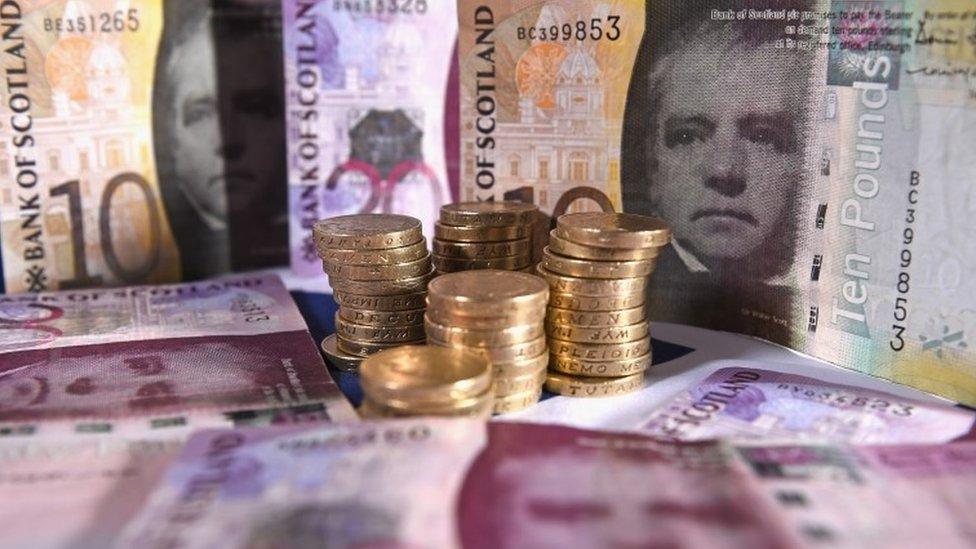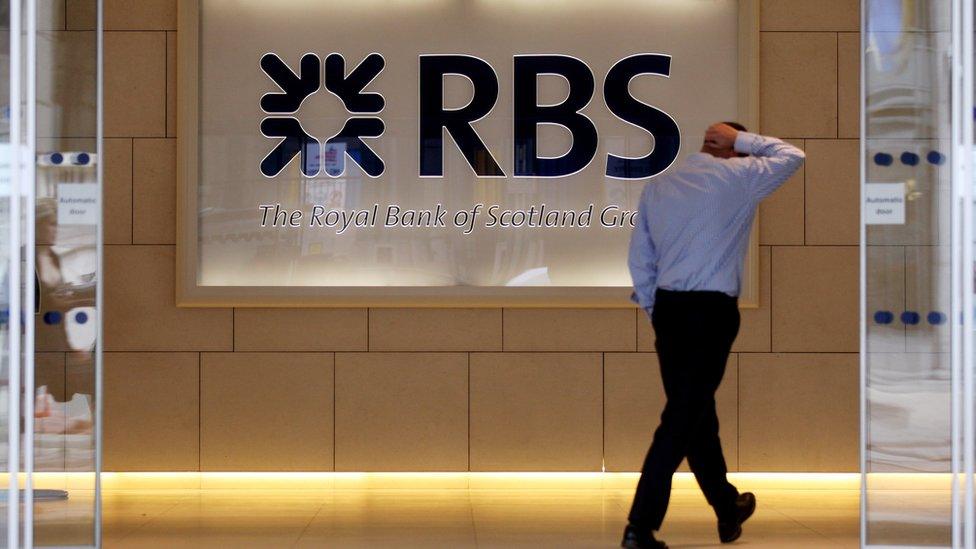Royal Bank's painful legacy
- Published

It's seven years since Royal Bank of Scotland published annual results with a headline loss of more than £24bn.
There was a three-to-five year plan put in place to turn it around, with the non-core fifth of the bank to be axed.
Seven years later, and the colour of the ink remains the same, the tale of woe a bit like Groundhog Day. The eighth successive loss is smaller, but it's still a whopper and still in the billions - very nearly £2bn, to be more precise.
The recovery plan has stretched to 10 years. And while Lloyds Banking Group has dug itself out of its nightmare, and most of its government shareholding, RBS is far behind in that process, still 73% Treasury-owned with no dividends payable yet.
Even though much of the pain had been signalled, the 2015 results triggered a 7% fall in the share price (against a rising market on Friday), to 226p. That's less than half the amount the taxpayer paid for them in 2008 and 2009.
PPI claims
The Lloyds results on Thursday showed the chief executive receiving pay and bonuses totalling £8.8m for last year, while at RBS, Ross McEwan felt obliged to forego some bonus and give another part to charity. Humility remains a trapping of his office.
The underlying activities of the bank aren't that bad, for instance in the UK mortgage market, and this remains the biggest player in lending to Britain's businesses.

RBS chief executive Ross McEwan gave up some of his bonus and gave another part to charity
But that's a bit like saying the eurozone economy has been in great shape, apart from all its problems.
Payment Protection Insurance, for instance: on this score, RBS is nowhere near the scale of Lloyds' problems, but the Royal has had to find another £600m for last year, taking its total cost to £4.3bn.
Having exited its overseas private wealth bank, to focus on Coutts and Adam & Co in Britain, it is taking a £500m impairment charge on that division.
An enormous amount has been set aside by RBS for unresolved US litigation over its pre-crash handling of toxic financial products pre-crash.
Market rigging
It was always going to be time-consuming and expensive to unravel its American problems (BP knows the feeling, having reached $55bn in costs for the Deepwater Horizon explosion and spill).
But this is not all about unwinding the spectacular over-reach of the pre-crash Fred Goodwin era.
The rigging of markets has happened since then, and the litigation risks (which every company ought to declare) make for quite a read. So to recap, from page 338 and 390 of a stable-door-stopping 424-page annual report:
with more than 20 American law suits in the pipeline over the issue and trading of mortgage-backed securities, £2.1bn is being set aside. That is in addition to several US regulators on the case, for which nothing has yet been set aside (by the way, "The Big Short" is recommended cinema viewing on this subject)
£334m for investigations into rigging the foreign exchange market
there's that £600m for mis-selling of payment protection insurance. That brings the total on that front to £4.3bn, of which £3.3bn has been paid out so far
£68m more for mis-selling of interest rate hedging products, for which £1.35bn has already been paid out.
'Funds for terrorists'?
Scanning the litigation horizon, apart from the claims on mis-selling mortgage-backed securities, there are:
civil claims in the US over the rigging of the inter-bank lending rate and with claims that the market in interest rate swaps was fixed between banks
civil claims from Australia and the Netherlands about derivative products
regulatory action in Canada and elsewhere about foreign exchange rigging
US regulators claiming the blocking of access to derivative markets
civil action for $238m over RBS's transfer of funds in the Bernie Madoff fraud case, when it is claimed it knew or should have known what was going on
a large number of cases in the UK around the mis-selling of interest rate hedging products to business customers
there's an investigation, soon to report, into serious allegations that a division of RBS, the Global Restructuring Group, was sent in to distressed company clients after the financial crash, and treated them very badly indeed
several shareholder groups are suing over Fred Goodwin's £12bn rights issue in spring of 2008, claiming they were knowingly misled. Cases are likely to reach court this year
RBS is facing a legal claim that it handled funds for a Hamas front organisation in Palestine, allegedly implicating it in terrorist attacks: and other claims that 70 terrorist attacks in Iraq over eight years were funded through transactions with Iranian banks.
Headwinds
Returning to the core area of banking in Britain, RBS can see "headwinds" (a favourite word of bankers) from general uncertainty about the world economy, as it affects the bank's customers.
So growth in target areas may slow up, while big turnaround costs still hang heavy. The cost of restructuring RBS between 2015 and 2019 is put at £5bn, with £1.5bn losses as it disposes of assets.

This year is expected to see more than £1bn of the restructuring costs (and don't be surprised if that involves quite a lot of jobs), as it tries to match outlays with its much diminished operations. The ratio doesn't currently look good by industry standards. RBS is also on track for about £1bn of those disposal costs.
The bank is having a tough time slewing off Williams & Glyn's, the retail and business arm it has carved out with a view to a float, under instruction from the European Commission. Untangling the governance and technical IT end of this has been causing difficulties for years.
The sale is now being put back further, towards the end of next year. Total cost of the process so far: £1.2bn.
That's while a lot of management time is taken up with ring-fencing the bank, as required by government and regulators by 2019, to protect the core parts from the risky ones.
Normalisation
You can see, from this, why chief executive Ross McEwan longs to contract the Royal Bank's reach, so that it behaves like a normal bank, focused on the UK and Ireland, and loved by its customers.
On that front, he has put an increased emphasis on customer satisfaction, based on two questions put to customers: would you recommend RBS, and do you trust it to do the right things?
According to the annual report, those numbers are going in the right direction. But it remains clear that the NatWest brand is much less sullied in England and Wales than RBS is in Scotland.
Retail and business customers of RBS are still, on balance, minded not to recommend it. Both those brands are far ahead of Ulster Bank in Ireland.
Changing tone
No doubt that is because companies with financial difficulties are not too happy when the RBS "relationship manager" calls with bad news.
While loan impairments in the property sector have seen a marked rise in the past year, quite a few of the companies getting a chilly reception from RBS seem to have been in the oil and gas sector.
The annual report discloses that RBS has cut sharply back on exposure to resource-based companies, with 70% less lending to oil and gas firms. Environmental campaigners have been pushing for that over several years.
But what is also striking is a change in tone around this year's results.
For years, the humility has come with a promise to provide a bedrock of lending support for the British economy. As the British public are majority shareholders, those interests have been aligned.
But with a sale of that stake afoot (eventually), there's a bit less of that from Ross McEwan.
Rather than portraying the Royal Bank as a sort of public service utility, divisions of RBS are being focused on higher value customers. That's about better return on capital and lower risk, which is the language shareholders like to hear.
Senior bank figures talk rather less patiently these days about corporate customers that fail to understand the products they're buying, and about retail customers who fail to protect their private data.
Maybe being somewhat more ruthless, and a bit less humble, seems to be part of that process of normalisation.
- Published26 February 2016
